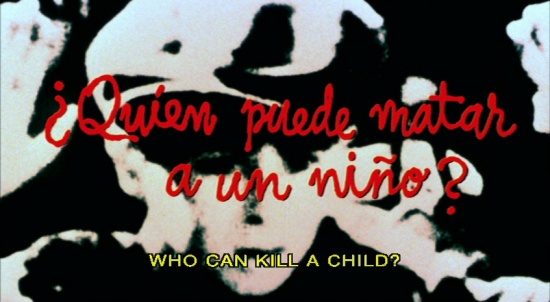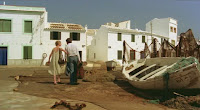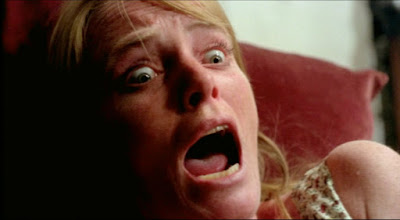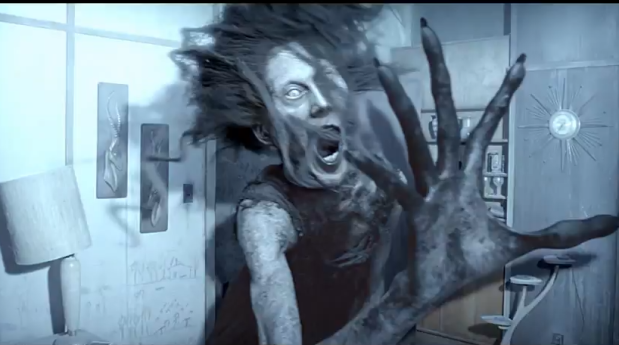It's a rather cool theme in horror movies to play on a fear of children. I considered a selection of 'child phobia' movies at the end of my review of "The Omen" and there are two more reviewed below that I watched for the first time this year.

Who Can Kill A Child? (aka "Death is Child's Play") (1976)
The original audience must not have known what was about to hit them with this movie. We start off with an accounts of several different wars and atrocities across the 20th century. The holocaust being just one amongst them. And in each case we are told about how awful the situation was for children in particular. These accounts are accompanied with black and white footage and an official-sounding voice behind them. At the end of each one we hear children singing a short but annoying tune. This gets REALLY repetitive. But the message is clear. Children have had a tough time through history.

The opening bit looks like this. It's a Spanish movie (even if the leads are English actors speaking English) so we keep seeing Spanish writing in this red handwritten style on screen, with the black and white footage and photographs from real life wars and atrocities in the background and that official-sounding documentary-style voice over (also in English) explaining how bad children have had it. At the repeated singing bit we see children's hand prints on the screen.
So with the audience nicely softened to the plight of children, now to begin a story where children are actually going to be quickly revealed as the bad guys. But first we are introduced to a couple of English tourists who decide to get away from the crowds and spend some time on a quiet local island. On the island however, it becomes clear that things are actually a lot quieter than they ought to be.

The visuals of crowds of children are extremely eerie. The movie takes its time, but I don't think the pacing ever feels unneccessarily slow. And when we come towards the end there's a pretty shocking revelation which I did not see coming. (If you reach a point where you think the movie has wrapped up too easily then don't worry, it's not over yet.)

Initially "Who Can Kill A Child?" feels like a version of "The Birds" only with children instead of birds. But it should be said that just having children just standing and watching like a flock, is more unnerving than a flock of birds hanging around since children so rarely organise themselves like that. The closer connection between ourselves and children is also a source of horror here. It's not just that children are not acting like we'd expect, but also that we think we can empathise with children.

In "Life of Pi" when Pi is told that he shouldn't think of a tiger like it has human feelings but should remember that it is a violent predator, we can more easily say "okay sure" no matter how cute a tiger might seem at times. But trying to believe that a child isn't being genuine? Trying to believe they are dangerous? Trying to think of them as cold killers behind those eyes? It's tougher to accept, which makes the slow build-up of this film all the more appropriate.

"Who Can Kill A Child?" is a horror classic, plain and simple. I felt that this was quite a devastating watch, but it's not because of gory scenes. Instead it's more because of the psychological element to it. I'm not actually sure that I'm even as fond of children as some people are (after all, I was kinda bored by the repetitive accounts of harm to children in the 20th century), so for others this might hit even harder.
A+

Mama (2013)
Yet another Guillermo Del Toro produced horror movie. Have had a pretty mixed response to these. I hated "Julia's Eyes", finding it to be a complete misfire with some intriguing ideas at the beginning leading to what I viewed as a pretty cheesy finale. Meanwhile I found some plot details revealed about "Splice" completely put me off ever seeing that. (The creature design might be great, but I do NOT want to see that film.)
But strangely, contrary to most other people's opinions, I LOVED "Don't Be Afraid Of The Dark". I felt that it was well-made and while many had criticised the film for revealing the monsters so quickly, I found their Gremlins-esque behaviour really spoke to me.

I was a little unsure about the trailer for "Mama" but I was seriously intrigued by the premise. Children lost in the woods are recovered, but they've become somewhat wild after their experience. But when they come to live with a foster parents back in a civilised environment, it turns out that some kind of spirit from the woods was keeping them safe and it isn't prepared to give up its hold over them just yet.

I'll come right out and say it, I was disappointed by this one. Which is a real pity because in the first half there are some moments which I thought worked very well. Sure in the first half there are also some of the those now-cliched jump-scare "booms" to emphasise important moments, which are intended to make things creepier. But these were moments where I felt that more natural sounds would have been far more effective. A child scampering away timidly on all fours like a woodland creature is surely much more disturbing if you hear the actual scampering than if you hear a horror-movie "boom" noise?

The question over whether the foster parents are really suited to their task is well handled. Jessica Chastain shows how much of a chameleon she can be, this time playing a rock chick. Her husband is an artist, but she is in a punk rock band and her lifestyle is partly tied with that. You may be wondering how these two ever found themselves in the massive house in the trailer? Well, I think it's an early enough plot move for me to reveal. The mental institute who are treating the children offer the couple the opportunity to live in a house owned by the institute (which has the space for them to care for the children) so long as the institute can continue to study the children and document their progress.

So, now in this big house, we have the children's weird behaviour on the one hand, but we also have clear hints that the "mama" figure which the children credit with looking after them in the forest is a spirit that still lives with them in this new house.
A big problem for me here is that this movie is a "ghost" movie. I wasn't expecting a ghost, I was expecting a forest spirit. But no, "Mama" is actually a ghost. A very specific person with a whole lame backstory.

The point where I think the movie goes downhill is where a woman in an archive says to a psychologist and therapist: "Do you believe in ghosts?" He answers "no" and the archivist immediately decides to tell him exactly what ghosts are. And then he presumably believes her. No no no no NO! I'm sorry, but firstly SHE knows nothing about what ghosts are. What is her basis for that knowledge? Archiving old documents and artefacts? REALLY? She's not a ghostbuster or "paranormal investigator" or psychic medium or something like that? So why does the psychologist believe her? He has reasons to think that a ghost might be involved and he says that he needs "extraordinary evidence" to back up the extraordinary claim, but hearing someone with no evidence or backstory at all state in no uncertain terms that ghosts are the twisted remnants of a persons life, or some such rubbish, would be more likely to have this guy dismissing all his notions of supernatural activity.
And what's the motivation of the ghost? To protect the children, right? Nope! (Yeah, I was confused too.) I won't say what actually happens at the end becuase I don't do spoilers. But I'll just say that the second half of the movie really loses track of its "protective spirit" premise.

I feel confident in saying that, whether you like ghost stories or not (and I'm definitely in the NOT category), this is going to be a disappointment.
E+

Who Can Kill A Child? (aka "Death is Child's Play") (1976)
The original audience must not have known what was about to hit them with this movie. We start off with an accounts of several different wars and atrocities across the 20th century. The holocaust being just one amongst them. And in each case we are told about how awful the situation was for children in particular. These accounts are accompanied with black and white footage and an official-sounding voice behind them. At the end of each one we hear children singing a short but annoying tune. This gets REALLY repetitive. But the message is clear. Children have had a tough time through history.

The opening bit looks like this. It's a Spanish movie (even if the leads are English actors speaking English) so we keep seeing Spanish writing in this red handwritten style on screen, with the black and white footage and photographs from real life wars and atrocities in the background and that official-sounding documentary-style voice over (also in English) explaining how bad children have had it. At the repeated singing bit we see children's hand prints on the screen.
So with the audience nicely softened to the plight of children, now to begin a story where children are actually going to be quickly revealed as the bad guys. But first we are introduced to a couple of English tourists who decide to get away from the crowds and spend some time on a quiet local island. On the island however, it becomes clear that things are actually a lot quieter than they ought to be.
The visuals of crowds of children are extremely eerie. The movie takes its time, but I don't think the pacing ever feels unneccessarily slow. And when we come towards the end there's a pretty shocking revelation which I did not see coming. (If you reach a point where you think the movie has wrapped up too easily then don't worry, it's not over yet.)

Initially "Who Can Kill A Child?" feels like a version of "The Birds" only with children instead of birds. But it should be said that just having children just standing and watching like a flock, is more unnerving than a flock of birds hanging around since children so rarely organise themselves like that. The closer connection between ourselves and children is also a source of horror here. It's not just that children are not acting like we'd expect, but also that we think we can empathise with children.
In "Life of Pi" when Pi is told that he shouldn't think of a tiger like it has human feelings but should remember that it is a violent predator, we can more easily say "okay sure" no matter how cute a tiger might seem at times. But trying to believe that a child isn't being genuine? Trying to believe they are dangerous? Trying to think of them as cold killers behind those eyes? It's tougher to accept, which makes the slow build-up of this film all the more appropriate.

"Who Can Kill A Child?" is a horror classic, plain and simple. I felt that this was quite a devastating watch, but it's not because of gory scenes. Instead it's more because of the psychological element to it. I'm not actually sure that I'm even as fond of children as some people are (after all, I was kinda bored by the repetitive accounts of harm to children in the 20th century), so for others this might hit even harder.
A+

Mama (2013)
Yet another Guillermo Del Toro produced horror movie. Have had a pretty mixed response to these. I hated "Julia's Eyes", finding it to be a complete misfire with some intriguing ideas at the beginning leading to what I viewed as a pretty cheesy finale. Meanwhile I found some plot details revealed about "Splice" completely put me off ever seeing that. (The creature design might be great, but I do NOT want to see that film.)
But strangely, contrary to most other people's opinions, I LOVED "Don't Be Afraid Of The Dark". I felt that it was well-made and while many had criticised the film for revealing the monsters so quickly, I found their Gremlins-esque behaviour really spoke to me.

I was a little unsure about the trailer for "Mama" but I was seriously intrigued by the premise. Children lost in the woods are recovered, but they've become somewhat wild after their experience. But when they come to live with a foster parents back in a civilised environment, it turns out that some kind of spirit from the woods was keeping them safe and it isn't prepared to give up its hold over them just yet.

I'll come right out and say it, I was disappointed by this one. Which is a real pity because in the first half there are some moments which I thought worked very well. Sure in the first half there are also some of the those now-cliched jump-scare "booms" to emphasise important moments, which are intended to make things creepier. But these were moments where I felt that more natural sounds would have been far more effective. A child scampering away timidly on all fours like a woodland creature is surely much more disturbing if you hear the actual scampering than if you hear a horror-movie "boom" noise?

The question over whether the foster parents are really suited to their task is well handled. Jessica Chastain shows how much of a chameleon she can be, this time playing a rock chick. Her husband is an artist, but she is in a punk rock band and her lifestyle is partly tied with that. You may be wondering how these two ever found themselves in the massive house in the trailer? Well, I think it's an early enough plot move for me to reveal. The mental institute who are treating the children offer the couple the opportunity to live in a house owned by the institute (which has the space for them to care for the children) so long as the institute can continue to study the children and document their progress.

So, now in this big house, we have the children's weird behaviour on the one hand, but we also have clear hints that the "mama" figure which the children credit with looking after them in the forest is a spirit that still lives with them in this new house.
A big problem for me here is that this movie is a "ghost" movie. I wasn't expecting a ghost, I was expecting a forest spirit. But no, "Mama" is actually a ghost. A very specific person with a whole lame backstory.

The point where I think the movie goes downhill is where a woman in an archive says to a psychologist and therapist: "Do you believe in ghosts?" He answers "no" and the archivist immediately decides to tell him exactly what ghosts are. And then he presumably believes her. No no no no NO! I'm sorry, but firstly SHE knows nothing about what ghosts are. What is her basis for that knowledge? Archiving old documents and artefacts? REALLY? She's not a ghostbuster or "paranormal investigator" or psychic medium or something like that? So why does the psychologist believe her? He has reasons to think that a ghost might be involved and he says that he needs "extraordinary evidence" to back up the extraordinary claim, but hearing someone with no evidence or backstory at all state in no uncertain terms that ghosts are the twisted remnants of a persons life, or some such rubbish, would be more likely to have this guy dismissing all his notions of supernatural activity.
And what's the motivation of the ghost? To protect the children, right? Nope! (Yeah, I was confused too.) I won't say what actually happens at the end becuase I don't do spoilers. But I'll just say that the second half of the movie really loses track of its "protective spirit" premise.

I feel confident in saying that, whether you like ghost stories or not (and I'm definitely in the NOT category), this is going to be a disappointment.
E+